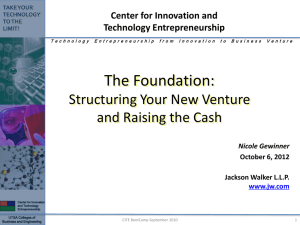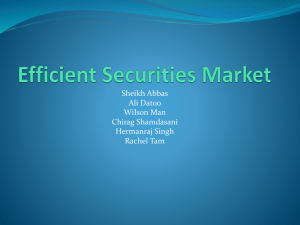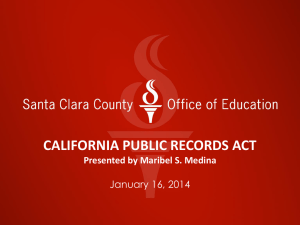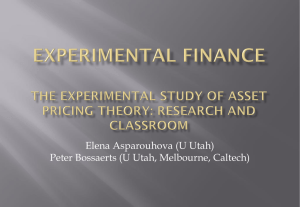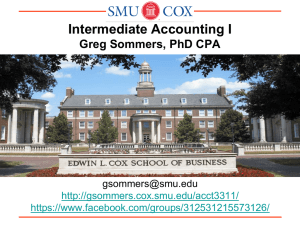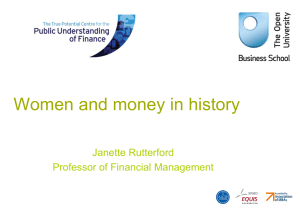Securities Regulation and Exemptions for Private
advertisement
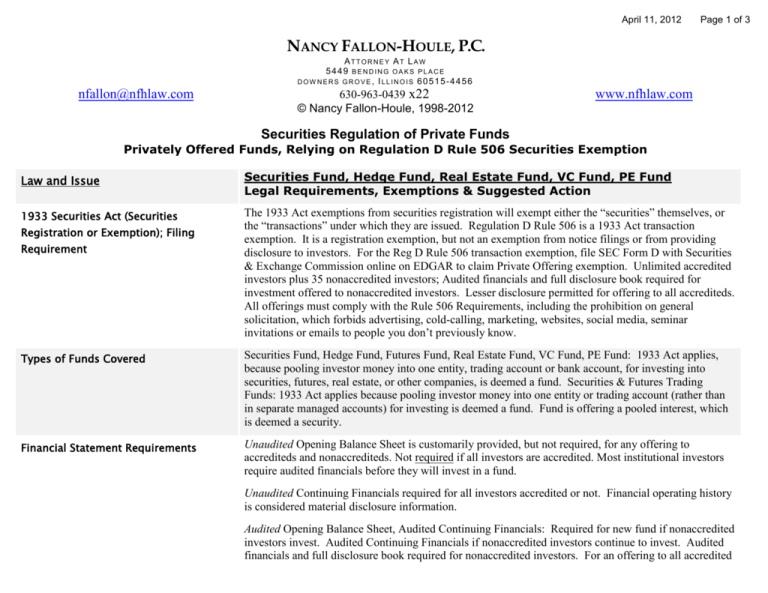
April 11, 2012 Page 1 of 3 NANCY FALLON-HOULE, P.C. ATTORNEY AT LAW 5449 BENDING OAKS PLACE DOW NERS GROVE, ILLINOIS 60515-4456 nfallon@nfhlaw.com 630-963-0439 x22 © Nancy Fallon-Houle, 1998-2012 www.nfhlaw.com Securities Regulation of Private Funds Privately Offered Funds, Relying on Regulation D Rule 506 Securities Exemption Law and Issue Securities Fund, Hedge Fund, Real Estate Fund, VC Fund, PE Fund Legal Requirements, Exemptions & Suggested Action 1933 Securities Act (Securities The 1933 Act exemptions from securities registration will exempt either the “securities” themselves, or the “transactions” under which they are issued. Regulation D Rule 506 is a 1933 Act transaction exemption. It is a registration exemption, but not an exemption from notice filings or from providing disclosure to investors. For the Reg D Rule 506 transaction exemption, file SEC Form D with Securities & Exchange Commission online on EDGAR to claim Private Offering exemption. Unlimited accredited investors plus 35 nonaccredited investors; Audited financials and full disclosure book required for investment offered to nonaccredited investors. Lesser disclosure permitted for offering to all accrediteds. All offerings must comply with the Rule 506 Requirements, including the prohibition on general solicitation, which forbids advertising, cold-calling, marketing, websites, social media, seminar invitations or emails to people you don’t previously know. Registration or Exemption); Filing Requirement Types of Funds Covered Securities Fund, Hedge Fund, Futures Fund, Real Estate Fund, VC Fund, PE Fund: 1933 Act applies, because pooling investor money into one entity, trading account or bank account, for investing into securities, futures, real estate, or other companies, is deemed a fund. Securities & Futures Trading Funds: 1933 Act applies because pooling investor money into one entity or trading account (rather than in separate managed accounts) for investing is deemed a fund. Fund is offering a pooled interest, which is deemed a security. Financial Statement Requirements Unaudited Opening Balance Sheet is customarily provided, but not required, for any offering to accrediteds and nonaccrediteds. Not required if all investors are accredited. Most institutional investors require audited financials before they will invest in a fund. Unaudited Continuing Financials required for all investors accredited or not. Financial operating history is considered material disclosure information. Audited Opening Balance Sheet, Audited Continuing Financials: Required for new fund if nonaccredited investors invest. Audited Continuing Financials if nonaccredited investors continue to invest. Audited financials and full disclosure book required for nonaccredited investors. For an offering to all accredited April 11, 2012 Page 2 of 3 investors, audited financials are not required, but are currently “market” and therefore are typically provided, if not at the opening, then after the first year. Disclosure Document: Offering Memo Rule 10b-5 under the 1934 Act. Offering Memo (Disclosure Document), under 10b-5 (Antifraud) provisions of 1933 and 1934 Acts. Even a private fund, exempt from SEC registration, is not exempt from disclosure. Therefore, fund must provide “full and fair disclosure of all information material to the investment decision”. The full disclosure is typically accomplished through full Offering Memo or Disclosure Document given to investors before they invest. However, other shorter methods of disclosure may be accomplished. Full Offering Memo required if nonaccredited investors will invest. Contents dictated by Reg D Rule 502 Blue Sky (State Securities Law) – State Form D Notice Filing Required + Other Documents + Filing Fees in Each State (Filing Fees Range From $0 to $1,385, average is $200-$300 per state. Legal fees $600 per state, except NY and CT are higher. under the Securities 33 Act (Reg D) and Registration of Fund 1940 Act (Investment Company Act – Registration of Exemption) Exemptions: § 3(c)(1): Limit of 99 accredited investors, or §3(c)(7): Limit of 499 Qualified Purchasers, or §3(b)(1) exemption for Commodity Pools Qualified Purchaser is an Investor who owns $5 million in investments or manages $25 million in investments for itself and others. State Investment Company – Blue Sky No Laws Apply 1934 Exchange Act – Broker-Dealer If “Issuer-sold”, no need to use a registered securities broker-dealer. If “issuer-sold”, only officers of the issuer or of fund manager can sell interests. Rely on federal Rule 3(a)(4)-1 for an exemption from broker-dealer registration for officers of the issuer. To use exemption, officer cannot be involved in offerings of any other issuer concurrently and cannot have been involved in the last 12 months in any other offering. Officer cannot receive no commissions, or Register the officer with FINRA, if person will be receiving compensation, commissions, finders' fees, or equity / stock for bringing investors into the Fund. Series 7 Exam, U-4, Fingerprint cards. No bonding or net capital required. Register officer in some of the states required, or Use a registered broker-dealer to market or sell Fund Interests (may use your prime broker). Registration Broker-Dealer Registration, or Issuer-Dealer Registration or Exemption State Broker-Dealer , or Issuer- Dealer, Registrations or Exemptions Investment Adviser’s Act of 1940 and Dodd- Frank Act. Applies to entities, or Register any non-officer employee of the Issuer as an “agent of the Issuer” (Series 7 and 63 Exams required), U-4, some states require fingerprint cards, or Rely on state Issuer-Dealer Exemptions for Officers of the Issuer, who are not taking any fees for bringing in investors. A few states have ID exemptions. CT, NH, VT, FL do not have exemption, among others. Illinois exemption at §2, or Use registered broker-dealer. Fund Managers with $25 million to <$100 million AUM, must register with states (except NY, WY and MN register with SEC). Fund Managers with $100 - $150 million AUM, must Notice File with the SEC April 11, 2012 Page 3 of 3 fund managers, who manage more than 1 fund, or who advise investors in which fund to invest. on ADV Part I, as an “Exempt Reporting Adviser” (ERA), and must register with their home state (if that state requires registration.) Fund Managers with at least $150 million under management, must register with the SEC as a registered Investment Advisor, filing Form ADV Part I and II. Exemptions for VC Funds, family offices and foreign private advisor as ERAs. No exams for SEC. States require Series 65 Exam, waivers permitted for lengthy industry experience. Fund Manager Files Form ADV with SEC on IARD electronic system for SEC and states. SEC will audit Adviser approximately once every 3-5 years, unless facts determine more frequent audit. Thorough and consistent disclosure on ADV Part I and Part II, as well as fund disclosure, trading compliance manual and AML compliance manual, will streamline the audit. State Investment Adviser Registration If Manager is SEC-Registered, or is an SEC ERA, then simple state electronic notifications (and small fees) required in states where Manager office is located, and in states where fund clients reside. Not all states require notices where fund clients reside, and some de minimus exemptions may apply. If Manager is not SEC-Registered, then full state registration required, including paper and electronic components. But many states have “de minimus” exemptions if “< 5 clients” in the state and no office in state. Principals take Series 65 Exam for state registrations. Manager Files Form ADV with SEC on IARD electronic system for SEC and states. Thorough and consistent disclosure on ADV Part I and Part II, and in fund disclosure, trading compliance manual, and AML compliance manual, will streamline the review, approval and clearance. States will audit Adviser approximately once every 3-5 years, unless facts determine more frequent audit. Anti-Money Laundering: U.S. Patriot Act. Applies to non-U.S. investors. Fund manager must implement, and follow, Anti-Money Laundering Procedures, Compliance and Certifications by non-US investors, banks, brokers, others. Extra compliance for “suspect countries”. ERISA – Plan Assets 29 CFR 2510.3-101 ERISA Investor money (all types, including self-directed IRAs to huge pension funds) must be less than 25% of fund’s total assets, to avoid “Plan Assets” determination. Plan Assets triggers costly and complex ERISA compliance for the fund. Exemptions from the 25% rule for VC Operating Funds (“VCOC”) (c) and (d), Real Estate Operating Funds (“REOC”) (c)(1) and (e), “Operating Companies” (c), and Equity Interests in Public Issuers (b). Privacy Policies and Notices Fund Manger must implement and maintain privacy policy to protect confidentiality of investor data collected on Subscription Agreements and other documents, as well as data maintained electronically. Disaster Recovery Disaster recovery plan required for data, physical assets and the human beings have become the standard of Practice in the Fund Management industry. _______________________________ This chart is the copyrighted work product of Nancy Fallon-Houle and is not authorized to be given to, or used by, any person other than those to whom it has been given by Ms. Fallon-Houle.
